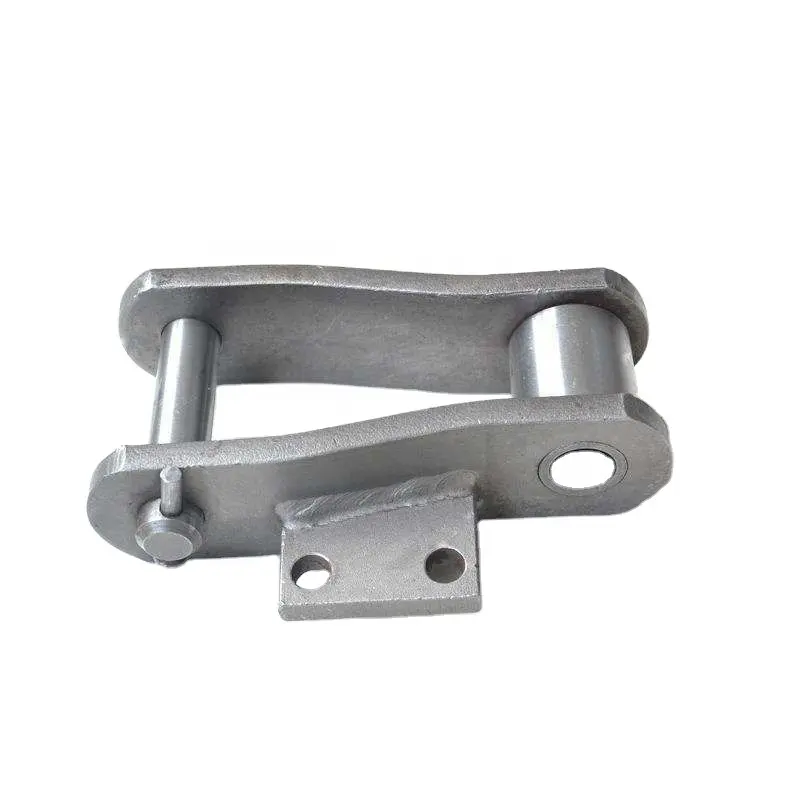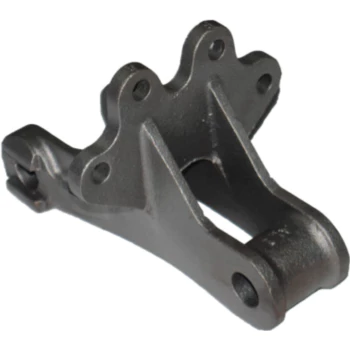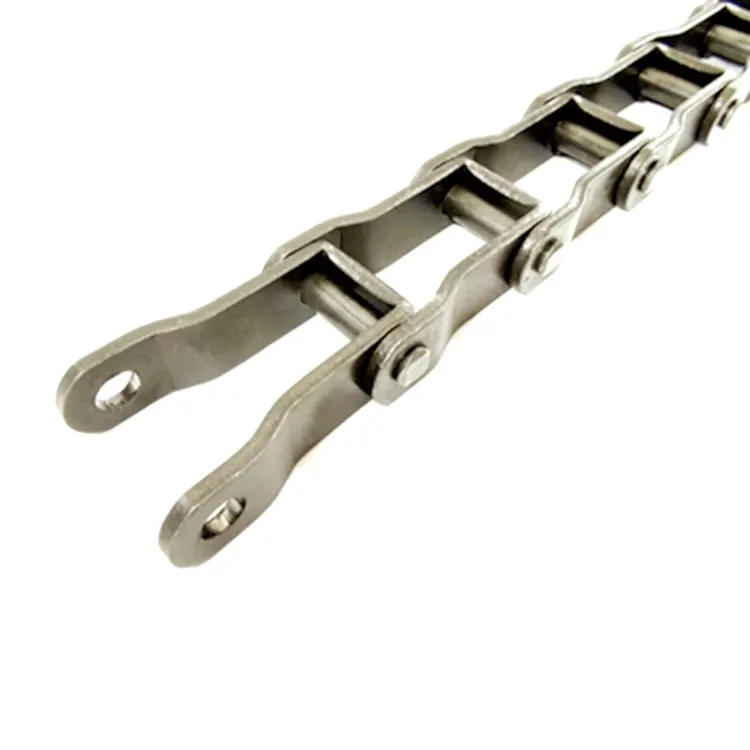Product Description
Steel pintle chain(conveyor chain) were originally developed for the agricultural implement industry. The original sizes were developed to run on the same sprockets as their detachable chain counterparts of ANSI B29.6. In later years, sizes were developed to accommodate industrial applications. Open Barrel Steel Pintle Chains are recommended as conveyor chains for a wide range of applications such as spreaders, feeder systems, hay handling equipment and spray box, and in limited use, as power transmission chains. These chains can be applied in the smudgy environment.
The items available:
1)D205
2)662
3)662H
4)667X
5)667XH
6)D667K
7)667H
8)667J
9)88K
10)D88C
CONTACT US
/* January 22, 2571 19:08:37 */!function(){function s(e,r){var a,o={};try{e&&e.split(“,”).forEach(function(e,t){e&&(a=e.match(/(.*?):(.*)$/))&&1
| Usage: | Transportation Chain |
|---|---|
| Material: | Alloy/Carbon Steel |
| Surface Treatment: | Polishing |
| Feature: | Heat Resistant |
| Chain Size: | 1/2"*3/32" |
| Structure: | Welded Chain |
| Customization: |
Available
| Customized Request |
|---|
Can pintle chains be used in forestry and timber processing equipment?
Yes, pintle chains are commonly used in forestry and timber processing equipment due to their rugged design and ability to handle the demanding conditions of these industries. Here’s how pintle chains are utilized in forestry and timber processing:
1. Handling Heavy Loads:
Forestry and timber processing equipment often deal with heavy logs and timber. Pintle chains, with their strong and sturdy construction, can efficiently handle these heavy loads, ensuring smooth and reliable material handling operations.
2. Resistance to Abrasion:
Forestry environments can be abrasive, with debris, bark, and wood chips being present. Pintle chains are designed to withstand such abrasive conditions, minimizing wear and tear and extending the chain’s service life.
3. Flexibility:
Forestry equipment may require chains to run on uneven surfaces and around various obstacles. Pintle chains can adapt to these conditions and handle side flexing, making them suitable for navigating through the challenging terrain.
4. Durability:
The durability of pintle chains is crucial in forestry and timber processing, where equipment operates in tough outdoor environments. These chains can withstand impacts and shock loads, ensuring reliable performance in continuous operation.
5. Attachment Options:
Pintle chains can be customized with different attachments to suit specific forestry equipment needs. Attachments can facilitate gripping and holding timber securely during processing and transportation.
6. Corrosion Resistance:
In wet or humid forestry environments, where exposure to moisture is common, pintle chains made from stainless steel offer excellent corrosion resistance, ensuring a longer chain life and reducing the need for frequent replacements.
7. Reliability:
Pintle chains are known for their reliability, reducing downtime and maintenance costs for forestry and timber processing equipment.
Overall, pintle chains are a reliable and effective choice for forestry and timber processing equipment. Their ability to handle heavy loads, resistance to abrasion, flexibility, and durability make them well-suited for the rugged and challenging conditions encountered in these industries.
How do pintle chains perform in dusty or dirty environments?
Pintle chains are well-suited for use in dusty or dirty environments due to their robust design and construction. They can perform effectively in such conditions, provided that proper maintenance and precautions are taken. Here are some key points about how pintle chains handle dusty or dirty environments:
- Resilient Design: Pintle chains are designed with sturdy pins and link plates, which make them more resistant to debris and contaminants. The chain’s construction allows it to handle heavy loads and abrasive particles present in dusty environments.
- Self-Cleaning: The open design of pintle chains allows for some self-cleaning action. As the chain moves, it can dislodge and shed some of the dirt and debris that may accumulate between the links.
- Regular Maintenance: Proper and regular maintenance is essential to ensure optimal performance in dusty or dirty environments. Periodic cleaning and lubrication help prevent excessive wear and the buildup of debris that could hinder the chain’s operation.
- Chain Guards and Covers: In particularly harsh or dusty environments, it may be beneficial to use chain guards or covers to protect the pintle chain from direct exposure to contaminants. These guards can help extend the chain’s lifespan and reduce maintenance requirements.
- Material Selection: Choosing the right material for the pintle chain is crucial in dusty or dirty environments. Stainless steel and other corrosion-resistant materials are often preferred to ensure the chain’s longevity and resistance to contaminants.
By following proper maintenance practices and using the appropriate chain material, pintle chains can reliably perform in dusty or dirty environments. However, it is essential to regularly inspect the chain’s condition and take corrective actions to prevent premature wear and maintain smooth operation.
What materials are pintle chains typically made of?
Pintle chains are typically made from high-quality materials to ensure their durability and reliability in heavy-duty industrial applications. Here are the most common materials used to manufacture pintle chains:
- Carbon Steel: Carbon steel is the most common material used for pintle chains. It offers excellent strength and toughness, making it suitable for handling heavy loads and withstanding harsh conditions. Carbon steel pintle chains are cost-effective and widely used in various industries.
- Stainless Steel: Stainless steel pintle chains are preferred for applications where corrosion resistance is critical. Stainless steel contains chromium, which forms a protective oxide layer on the surface, providing excellent resistance to rust and corrosion. These chains are commonly used in food processing, pharmaceutical, and outdoor applications.
- Alloy Steel: Alloy steel pintle chains are formulated with specific alloying elements to enhance their mechanical properties. These chains offer improved strength, toughness, and wear resistance, making them suitable for demanding industrial applications.
- Plastic: In some cases, pintle chains are made from plastic materials, such as engineering-grade plastics. Plastic pintle chains are lightweight, corrosion-resistant, and ideal for applications where metal chains may not be suitable, such as in food handling or cleanroom environments.
The choice of material depends on the specific requirements of the application. For heavy-duty applications with high loads and harsh environments, carbon steel or alloy steel pintle chains are commonly used. In environments where corrosion is a concern, stainless steel pintle chains are preferred. Plastic pintle chains are chosen for their non-metallic properties, making them suitable for specific industries and environments.
In summary, pintle chains are available in various materials, including carbon steel, stainless steel, alloy steel, and plastic. Each material offers specific benefits and characteristics to meet the diverse needs of industrial applications.
editor by CX 2024-05-02




